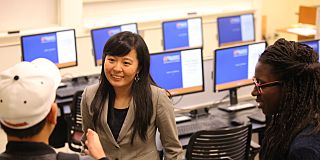

Stefano Grazioli
Professor, General Faculty
Director, M.S. in the Management of Information Technology Program
- +1 434-982-2973
- grazioli@virginia.edu
- Rouss & Robertson Halls 334
- Ph.D., Management Information Systems, University of Minnesota
- M.S., Computer Sciences, University of Minnesota
- B.S., Business & Economics, Bocconi University, Milano, Italy
Professor Grazioli is the Academic Director of the M.S. in the Management of Information Technology (MSMIT), a graduate program that develops managers who deliver greater business value through information technology. Program participants are seasoned professionals with an average work experience of 14 years. MSMIT has been in existence for over 25 years, and Professor Grazioli has directed it for the last decade. Dozens of his students have achieved C-level positions in business and nonprofit organizations.
Professor Grazioli has taught management of information technology, digital innovation, enterprise architecture, databases, financial engineering, and business process modeling to undergraduate, graduate, and executive education classes in the United States, Europe, and South America. His contributions as an educator have been recognized with the UVA All-University Teaching award (2009), the 12th annual Faculty Award from UVA's Order of Claw and Dagger (2018), and the Jefferson Scholars Foundation Award for Excellence in Teaching (2022).
Professor Grazioli has conducted research, educational, and training projects for major organizations such as Bank of America, the Internal Revenue Service, Norwest Bank, KPMG, and Informix (now IBM). His teaching and research projects include the following themes:
Innovation
- “Digital Innovation,” a course that explores emerging digital technologies from a business and technological perspective. Examples include digital platforms with network effects, the Internet of Things, blockchain, robotic process automation, and many more.
- Design thinking in practice, a course based on Google Venture’s design thinking methodology.
IT and Finance
- Hedge tournament, in which students build an algorithmic trader that hedges a portfolio of stock and options.
- “Managing Risk in Social Exchange,” which contrasts and compares tactics that foreign currency traders and auditors use to make sense of risk posed by interaction with others (Psychological Explorations of Competent Decision-Making, Cambridge University Press).
Fraud Detection
- “Tactics Used against Consumers as Victims of Internet Deception” summarizes the findings from the construction of the first research database of cases of Internet deception and fraud (International Journal of Electronic Commerce).
- “Detecting Deception: Adversarial Problem Solving in a Low Base Rate World” (Cognitive Science) proposes and tests a theory of deception and its detection. The theory is applicable to a wide range of organizational settings in which information is strategically manipulated.
- “Perils of Internet Fraud: An Empirical Investigation of Deception and Trust with Experienced Internet Consumers” is the first experimental study of phishing, the widespread practice of deploying sites on the Web that mimic another site’s name or look for the purpose of stealing secrets or obtaining business directed elsewhere (IEEE Transactions on Systems, Man and Cybernetics).
Global
- “UVA in Argentina,” an IT practicum in which undergraduate student teams use information technology to solve real business problems experienced by small businesses in Mendoza, Argentina.
- “International IT Retrospectives,” a global residency during which graduate students analyze a major IT project that has been recently completed by an Argentine business. Graduate students use the tools covered in the M.S. in MIT Program to identify best practices as well as develop recommendations for improvement to share with their real-world clients.
Areas of Expertise
- Information technology
- Digital innovation
- Design and management of information systems
- Enterprise architecture
- Fraud detection


